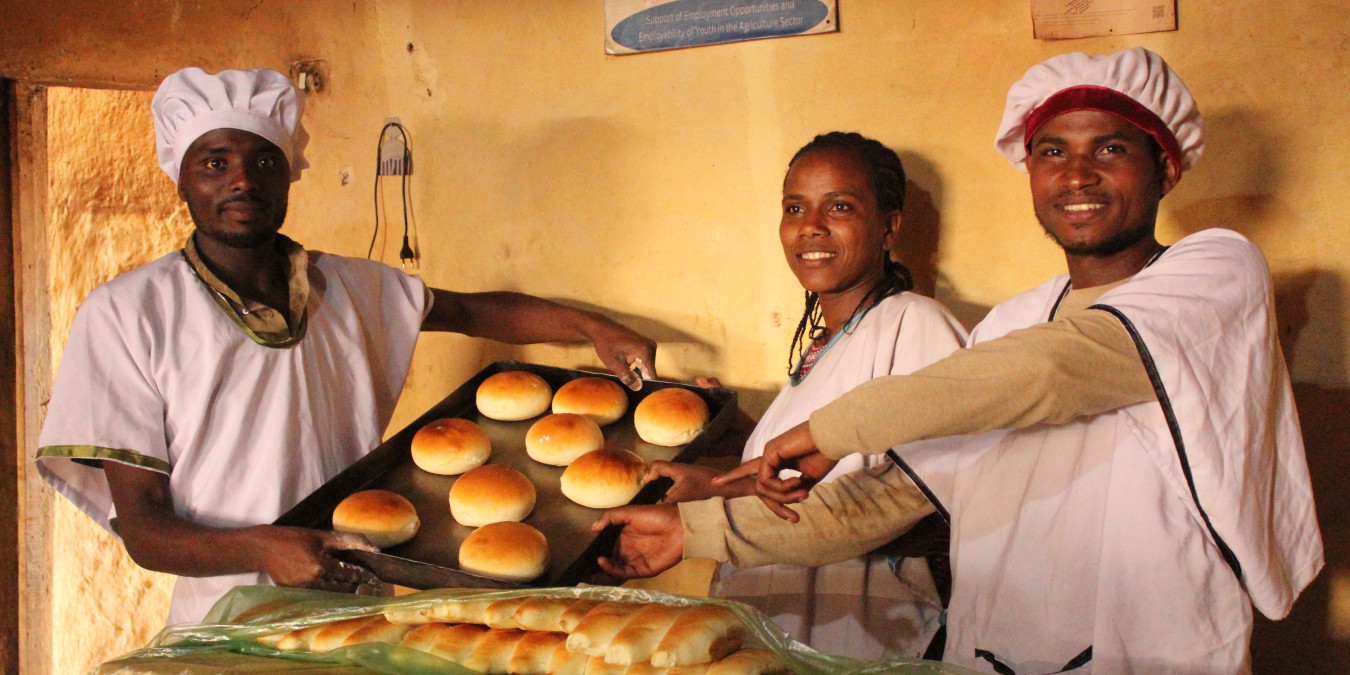Baking a Better Tomorrow: Youth Empowerment in Ethiopian Agro-Processing
Published: Jun 18, 2024 Reading time: 3 minutes Share: Share an articleOn a busy street in Daye City, the air is filled with the smell of freshly baked bread, thanks to the Andent Bakery. Andent is run by five vocational training course graduates who learned baking techniques on our Agro-processing programme. Andent is more than just a place to purchase bread; it's a symbol of resilience and empowerment for youths in the town.

Meet Tamerat Wonchana and his team, graduates in Agro-Food Processing from Daye Polytechnic. Despite their qualifications, these graduates faced challenges in securing jobs. They seized an opportunity to work with People in Need. Following training, they formed a team named Andent, which means Union in English. Their bakery is now bustling with customers enjoying breakfast and children purchasing bread. We provided Tamerat's team—and others—with machinery for baking, juice, and coffee processing, enhancing their capabilities.
In Daye Woreda, where traditional bread-making processes consume significant quantities of wood and energy,. Tamerat bakery business has become an admirable initiative for the community. The bakery currently serves numerous customers and has received expressions of appreciation from locals and the government.
We believe offering employment opportunities to unemployed graduates is an effective way to help them achieve their career goals and gain independence. Ethiopia faces a significant skills and job crisis, leaving millions jobless without good prospects for the future. The unemployment rate has grown as people migrate to urban areas in search of employment, exacerbating competition for jobs. The COVID-19 pandemic further disrupted the education sector, delaying graduation and releasing a surge of graduates into an already strained job market. Additionally, ongoing security issues and changes in education curricula have left many youths unemployed. Taken together, these factors underscore the need for continued support to empower the next generation of Ethiopian entrepreneurs and leaders.
To help companies overcome shortages in skills and experience, the Czech Development Agency funded an Agro-processing project. This project enhances the managerial, financial, and business skills of local Micro and Small-Scale Enterprises (MSEs).
The project focuses on improving cooperation among local agro-processing value chain actors through a public-private partnership platform, fostering networking and collaboration within the sector. The project assessed TVET colleges and selected eight agro-processing courses for short-term training programmes. It facilitated the preparation and revision of training materials. It supported four TVET colleges (Aleta Wondo, Daye, Yirgacheffe, and Soddo) with equipment, capacity-building training, vocational guidance and counselling (VGC) manuals, income generation activities (IGAs), and monitoring tools to ensure high-quality training programmes and effective performance tracking.
The project provided agro-processing training to 400 young people, introduced the TVET-LEAD monitoring tool, and conducted quarterly assessments. These efforts resulted in increased youth employment, higher productivity in agriculture, and strengthened stakeholder networking. Overall, the project significantly contributed to improved vocational training, youth employment, and agricultural productivity.
By fostering economic growth and enhancing educational opportunities, we support several Sustainable Development Goals (Quality Education, Decent Work and Economic Growth, No Poverty, Zero Hunger). We are reducing poverty by providing economic opportunities for young Ethiopians. We are achieving this by improving education through enhanced vocational training, promoting decent work and economic growth by creating jobs and strengthening partnerships by encouraging effective stakeholder collaboration. These efforts highlight the project's broader impact on sustainable development in Ethiopia.
The project successfully provided agro-processing training to 400 youth, introduced the TVET-LEAD monitoring tool, and conducted quarterly assessments. These efforts resulted in increased youth employment, higher productivity in agriculture, and strengthened stakeholder networking. Overall, the project significantly contributed to improved vocational training, youth employment, and agricultural productivity.


